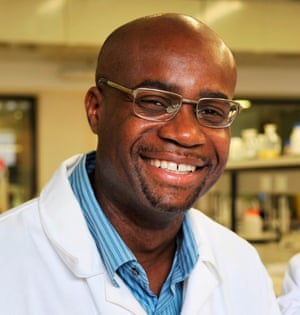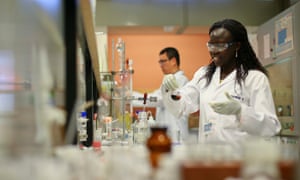The founder of Africa’s first drug discovery and development centre explains why scientific research is key to unlocking the continent’s potential
Date: Thu, 2 Jul 2015 23:56:08 +0200
The continent of Africa suffers a crippling disease burden, which continues to choke economic growth in addition to causing high morbidity and mortality. It is therefore vital for Africans to contribute to finding solutions to their health problems. The discovery and development of new medicines in Africa led by Africans is essential to that.
Long-term sustainable provision of new affordable medicines in Africa can only be ensured through committed investments in research and development (R&D) through African-led local and international public-private partnerships so that risks, and not just benefits, are shared. Africa needs science, not aid.
Science, in this context, means Africa having the capacity to use science for the benefit of its people. Historically the ability to discover and develop medicines has been hampered by lack of expertise and infrastructure. The reasons for this are varied but include the massive brain drain over many decades, fuelled largely by a lack of meaningful investment in research infrastructure by most African governments, which makes it almost impossible for scientists to implement what they have learnt back home.

Although research funding is a challenge, insufficient funds cannot be used as an excuse not to invest because it is all about setting priorities. Rather than coming up with research projects that are locally relevant but globally aligned, and doing what we can with what little we have, we African scientists sometimes complain and blame the government unfairly.
Money will follow good infrastructure, a good project, a dedicated team with integrated skills and a good network of partners. Our University of Cape Town Drug Discovery and Development Centre, H3D, has shown that the most effective way of building local capacity is to pursue projects. Some of the key ingredients to our success have been a good local (South African) research infrastructure, a supportive research environment within the University of Cape Town, South African government support and a network of (local and international) partnerships.
Another difficulty in fuelling sustainable R&D is a lack of continuity with respect to long-term funding and a sustained pipeline of projects. There remains significant gaps in areas of scientific development on the continent. Africa will always be reliant on external partners until these gaps are filled. There is an urgent need to find sustainable solutions that embed local capacity. The area of drug development needs to be viewed as a continuum, addressing one component will not suffice.
H3D has demonstrated that health innovation through drug development is possible in Africa and on the road to being sustainable. H3D – the first (and currently the only one) of its kind in Africa – has been harnessing modern pharmaceutical industry skills and expertise in the drug discovery value chain and in the process bridging the gap between basic sciences and clinical studies. Together this is creating a critical mass of African scientists with the capabilities of developing clinical drug candidates, with a unique focus on unmet medical needs.
R&D creates jobs and infrastructure, attracts foreign investment and reverses the brain drain
In 2012, an international project led by H3D in partnership with Medicines for Malaria Venture announced the discovery of a compound code named MMV390048 that could become part of a single dose cure for all strains of malaria. The compound further holds the potential to block transmission of the malaria parasite. If human clinical trials are successful, the compound could in future be launched as a medicine with the potential to impact both malaria control and eradication. It is the first time such a discovery has come out of Africa.
MMV390048 not only has the potential to save millions of lives, the multidisciplinary project that led to its discovery has enormous benefits for Africa in terms of skills, infrastructure and business development. The establishment of a state-of-the art drug discovery centre in H3D has the potential to lead to seeding a pharmaceutical industry that will seek to address the challenges of communicable and non-communicable diseases that are endemic to Africa, and for which there is a paucity of effective drugs. Overall this will result in socio-economic benefits for Africa.
Historically some of the communicable diseases endemic to Africa have not received significant attention from pharmaceutical companies due to perceived poor commercial returns. Indeed anti-infective drug discovery and development for tropical diseases had been stagnant for decades. However, there has been a renewed global effort to tackle the infectious disease burden with the involvement of large pharmaceutical companies in pre-competitive drug discovery through public-private consortia along with biotechs and not-for-profit organisations.
We have demonstrated that R&D is not a luxury. R&D provides solutions, creates jobs and infrastructure, builds capacity as well as expertise, attracts foreign direct investment, can seed an industry and contributes to reversing the brain drain. At the same time H3D has shown that it is possible to debunk the myth that Africa is not, and cannot be, a source of health innovation, and show that we can discover new medicines.
One important lesson from the experience of H3D is that we Africans should look critically at ourselves first and foremost before we can even start to think about blaming others for our problems. We will continue to struggle and lag behind the rest of the world as long as we do not create good local R&D infrastructure and supportive environments. We owe it to the next generation of Africans to do the difficult and painful things now so that they can have a better, more prosperous, more healthy and more peaceful Africa than we have had.
Kelly Chibale is the founder and director of the Drug Discovery and Development Centre (H3D) at the University of Cape Town.
For the next three months we’ll be running a special focus on the development of higher education in Africa. Do you have experience of the sector, or an informed point of view on this subject? We’re looking for comment and stories of best practice to run as part of our series on GDPN; contact us on globaldevpros@theguardian.com with “higher education in Africa” in the subject line.